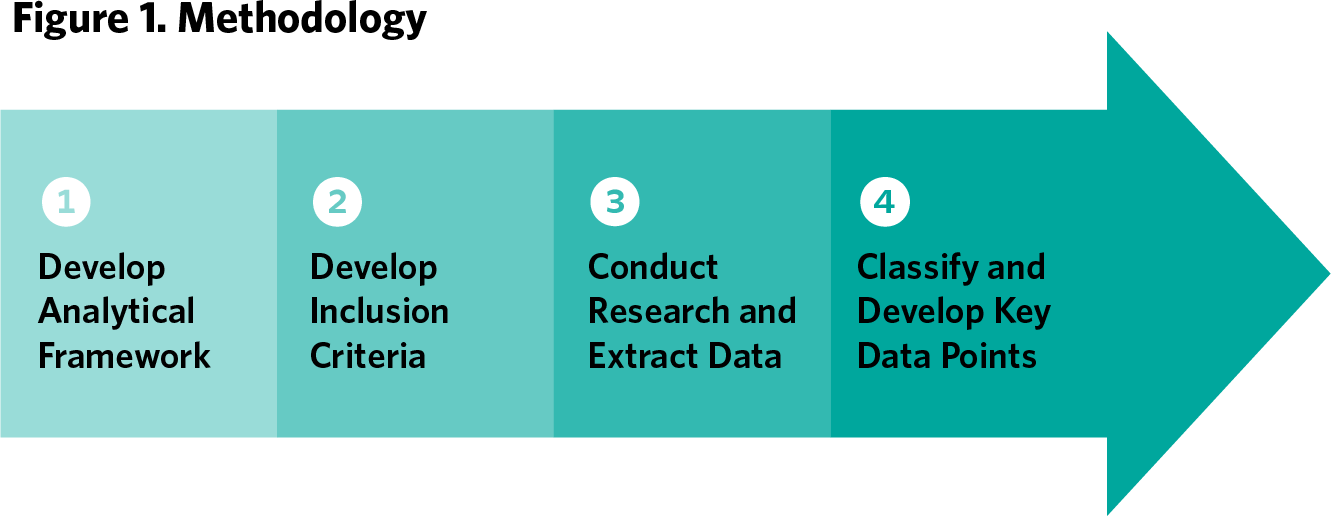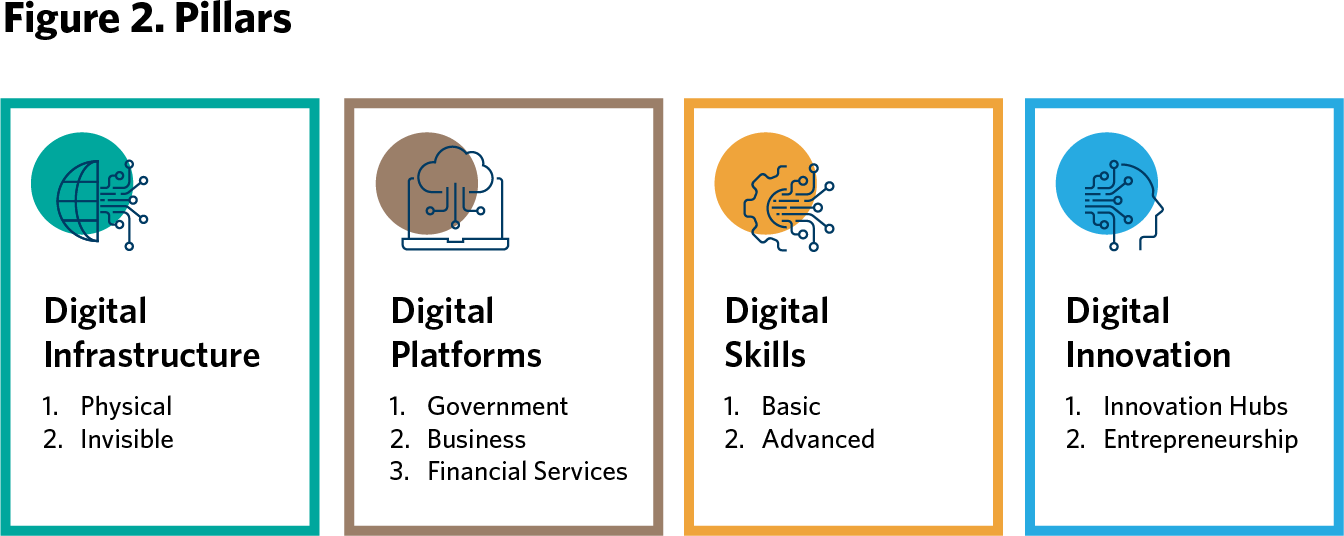Thanks for interacting with the Africa Tech Policy Tracker. Please note that this is an ongoing project. Our team periodically updates this data set with new legal documents as they become available. For questions and comments, email the project’s contacts.
Introduction
The African continent is undergoing a digital revolution. Increasing access to digital products and services has the potential to transform lives and economies, and African governments have developed policies to fully harness the impact of this digital revolution. As a result, the continent is rife with regional and national strategies envisioning digital transformations, as well as legal frameworks to define the rules for digital transactions and services. However, there remains neither a comprehensive resource for tracking technological policy strategies, nor a mechanism for peer learning among African countries on the policies that can best foster digital innovation.
To address this need, the Carnegie Africa Program, in collaboration with the Africa Telecommunications Union (ATU), has developed the Africa Technology Policy Tracker (AfTech), the first-ever continent-wide aggregate of digital economy laws, policies, and regulations.
The objectives of the research are:
- to provide a resource for accessing digital economy–relevant policies, laws, and regulations in the African continent, and a tool to support comparative policy analysis and tracking of digital economy regulations;
- to enhance visibility on the burgeoning tech regulatory environment in Africa by tracking the policies, laws, and regulatory actions of African governments; and
- to support knowledge dissemination and learning among African policymakers and stakeholders.
The Africa Tech Regulation Tracker
AfTech is a one-stop repository of national and continental technology frameworks in Africa. It is a research and policy tool that advances evidence-based policymaking in Africa's rapidly evolving digital economy. By cataloging policies across four main pillars digital infrastructure, platforms, skills, and innovation, AfTech makes it easy to explore, compare, and analyze policy actions shaping the continent’s digital future.
Methodology
Our approach to developing AfTech is summarized in four main steps:

- Develop the analytical framework by synthesizing global and regional digital economy frameworks.
- Develop inclusion criteria based on digital economy policies, strategies, laws, and regulations that have been enacted. The requirements are based on the policy and governance framework dimensions that define priority themes, as well as relevant timelines and content formats.
- Using the analytical framework and inclusion criteria:
- Pilot Phase: undertake desktop research; consideration is given to documents that offer English versions. Once documents (or information) are identified, they are reviewed to ensure they meet the inclusion criteria.
- Current Phase: collaboration with the ATU and country focal points—country representatives appointed by their government—to collect data through questionnaires.
- Finally, materials are added to the database. This involves extracting metadata, classifying according to the analytical framework, and tagging with search data points and source links.
The Data
AfTech is designed to cover all fifty-five African countries, the current phase covers thirty-six countries with over 550 data points on digital economy policies, laws, and regulations published between 1988-2024. The data is classified under four pillars and fifty data points that help users to search using thematic areas, such as artificial intelligence or cyber security (see glossary for full list of key data points).
- Pillars: This study has developed an analytical framework defined by four pillars and nine sub-pillars.

- The Pilot (2022–23)
The project started with development of a pilot consisting of eight pilot countries (Egypt, Kenya, Mauritius, Nigeria, South Africa, Rwanda and Senegal) that were chosen with the following criteria:
- Geographical representation
- A mix of digital development indicators (use of information and communication technology [ICT], contribution of ICT to GDP)
- The presence of national digital policies
The pilot phase was undertaken in FY 2022/2023 with a private launch on October 18, 2023. The Africa Program at the Carnegie Endowment for International Peace, in collaboration with the ATU, co-hosted a roundtable on Tracking Digital Technologies in Africa to launch the tracker prototype and to engage African policymakers and digital experts in a comprehensive discussion on the tracker. The event was on the sidelines of the Mobile World Congress Kigali 2023 Policy Leaders Forum and brought together stakeholders from government, civil society, and the private sector, including mobile operators, device manufacturers, and technology providers. AfTech was presented to select stakeholders who interacted with the tracker and provided vital feedback for the tracker’s further development. - Current Phase: (2024–2025)
In recognizing the need to collect accurate and up-to-date information to construct the AfTech data base, the African Program at Carnegie collaborated with the ATU, the specialized agency of the African Union (AU) in the field of telecommunications. The ATU is the leading continental organization fostering the development of information and communication technologies infrastructure and services. The agency draws its membership from the AU currently has forty-eight Member States and fifty-four Associate Members (comprising fixed and mobile telecom operators).
The mission of the ATU is to promote the rapid development of info-communications in Africa to achieve universal access, and full inter-country connectivity. Through its member states, the ATU designated two experts in ICT and digital policies and regulations to serve as focal points for this project. The focal points played a crucial role in contributing to the database. Through online meetings focal points attended a workshop for sensitization on the project and data collection. Utilizing data collection instruments (via Google form and Excel spreadsheet) and supporting documents (FAQs and data collection dictionary available in English and French) focal points submitted data points from their respective countries for the current phase between April and August 2024. Additional data points collected by the ATU secretariat and the Carnegie Africa Program were also included.
The tracker consists of thirty-six countries and over 500 data points. Additionally, the tracker consists of ten regional data point documents developed by the African Union.
African Union
Algeria
Angola
Benin
Burundi
Cameroon
Chad
Côte d'Ivoire
Country
DRC
Egypt
Eswatini
Gabon
Gambia
Ghana
Guinea-Bissau
Kenya
Lesotho
Libya
Mali
Mauritania
Mauritius
Morocco
Mozambique
Namibia
Nigeria
Rwanda
Senegal
Somalia
South Africa
Sudan
Tanzania
Togo
Tunisia
Uganda
Zambia
Zimbabwe - Search and Data Points:
A search can be undertaken with pillars, sub-pillars, and key data points. A full list of the data points is available in the glossary section of this page. - Next Phase
The next phase of the tracker will include:
- Country representation to cover all African countries and other regional documents by organizations such as SMART Africa.
- Thematic analysis: The project will provide research and analytical works that provide insights to help accelerate Africa’s digital transformation. For countries to effectively leverage digital technologies to transform the public and private sectors, as well as improve the quality of life for their citizens, governments need to build a solid foundation that fosters innovation and fuels the digital economy. This foundation consists of an enabling legal and regulatory framework.
- Thanks
The completion of this project was the result of several months of collaborative work between the teams of the African Telecommunications Union (ATU) and Carnegie Endowment for International Peace with the great support of the Union Member States to whom we would like to express our deep gratitude and our sincere thanks.
By the work of collecting key information on the digital policies and strategies for approximately thirty-six African countries, we are delighted to have succeeded today in developing the first African platform that describes the digital landscape on the continent, and which will not only serve as a reference for measuring digital development in Africa but will provide the necessary research and analysis elements for the policy makers, researchers, and all stakeholders.
A special thanks to the representatives of the ATU Member States who gave their time in collecting and transmitting data that contributed effectively to the project. We cite: Benin, Burkina Faso, Burundi, DRC, Cabo Verde, Egypt, Gabon, Gambia, Ghana, Guinee Bissau, Kenya, Liberia, Mali, Mauritius, Morocco, Namibia, Nigeria, Senegal, Somalia, Sudan, Chad, Zambia, and Zimbabwe.
